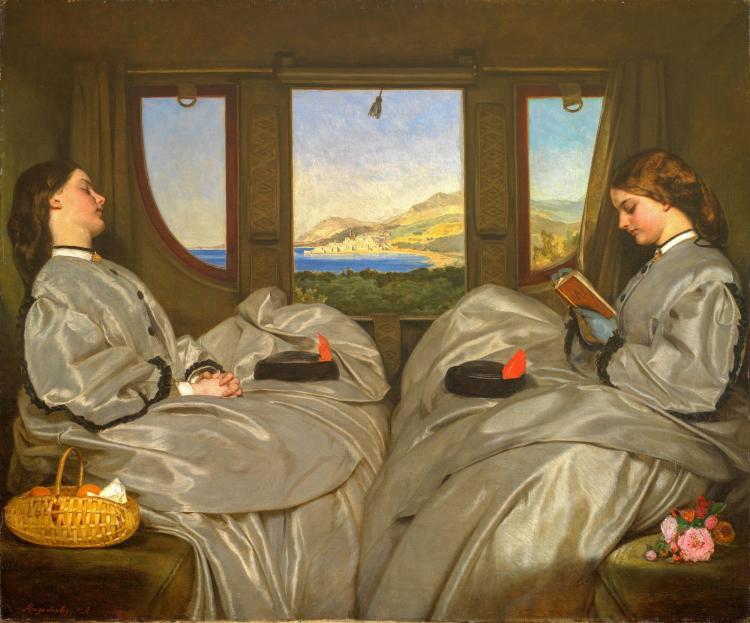A group of people travelling by train get stranded when the train is brought to a halt by snow drifts. They get talking and it turns out that one of them, a man called Maltby, is an expert on psychic phenomena: his conversation makes the others rather uneasy. Suddenly, Maltby takes off, having seen something moving outside. Eventually the others follow realising it's a choice between walking and possibly being stranded in the train for days. They all pitch up at house which is oddly abandoned. 'Oddly' because it seems the owners lit the fire, laid the table for a meal and then left. It's spooky to say the least. With two of their number injured they realise they will have to spend the night as uninvited guests. But where exactly are the owners and who is the ruffian who turns up out of the blue and what is he looking for in the house? One thing's for sure... it's going to be a very long night.
This is one of those gorgeous new editions of British Library Classics, reissues of crime stories originally published in the 1920s, 30s and 40s, all with lovely covers. They're proving to be very popular and it's easy to see why as they recall a sort of golden age of crime writing and are very reminiscent of the writings of Agatha Christie and so on. Often they're books whose authors have been largely forgotten... I'd never heard of the wonderfully named J. Jefferson Farjeon for instance, despite him having written, apparently, over 80 novels. (He was also descended from Thomas Jefferson, just as a matter of interest.) Anyway, this was an enjoyable yarn with a spooky bent... not enough to be frightening, but enough to give it a frission of excitement. For those who like a book with a snowy setting this is perfect... it's snowy all the way through and there is *lots* of it! I wouldn't say that the characters jumped off the page at me but the mystery element and the setting make up for that. The cover declares it to be 'A Christmas Mystery'. If that's what you're looking for this is not really it. It's definitely snowy, but is not all that Christmassy, not in my opinion anyway. A good solid vintage crime yarn that made a fun and enjoyable, winter's read.
Mystery in White is my book 4 for Bev's Mount TBR 2016. It also qualifies for her Vintage Mystery Cover Scavanger Hunt as 'Book with a Christmas Tree on the cover' (it's on the front of the train).
Next, The Sea Detective by Mark Douglas-Home.
Cal McGill is an expert on tidal forces in the seas and oceans of the world, especially those around the North Atlantic that affect his home country of Scotland. His ancestors were from a now uninhabited island off the west coast of Scotland, his grandfather having died along with six other men during the second world war. Their trawler was on war business in the seas around Norway at the time but mystery surrounds his grandfather's death and his name is not on the war memorial to their heroism.
Feet in trainers are being washed up around the Scottish coast and the police are investigating. DC Helen Jamieson is a junior detective involved in the case but having a hard time with a good looking, promotion-seeking boss who despises her because she's overweight and not beautiful. While all this is going on an Indian girl, Basanti, has escaped captivity and has seen a picture in the paper of a girl, Preeti, who was taken prisoner with her. The picture was in the paper, a picture of Cal McGill and beside him on the wall, pinned to his charts is a picture of her friend, Preeti. Why is it there? Basanti makes her way to Edinburgh to find Cal, but he's gone to a Scottish island to try and discover why his grandfather's name is not on that war memorial...
I'm not sure that that's a very good description of what is quite a complicated book. Lot going on this one, three plotlines to follow, but I have to say I didn't find it difficult at all. One of the storylines, that of Basanti and Preeti, is quite disturbing in a sexual abuse manner so if that's not your bag, avoid this one. Cal McGill is a very different sort of hero, not really heroic at all just an ordinary bloke who is very bright and obsessed with oceans and tides. It was all rather fascinating to be honest. Helen Jamiesson I liked very much too, representing the ordinary woman who is clever and outlining the way they can be treated by shallow people who think that looks are everything. Unusual for a male author to understand that perspective I would have thought and Mark Douglas-Home clearly does. Helen's boss, DI Ryan, is appallingly chauvanistic and a fun aspect of reading this book is cheering Helen on as she copes with this. The other plotline, the historical one of the wartime island heroes, was also extremely well done and fascinating to follow. Lots of secrets and nastiness in how Cal was treated by descendents of the men who died along with his grandfather. Good sense of isolated communities on Scottish islands back in the 1930s and 40s.
I gave this book five stars out out five on Goodreads. That's how much I liked it. You can always tell what effect a book is having by how much you want to keep picking it up to read on, and I found it hard to put down, which I had to a lot this week as I've been busy. There are two more books and I'll be getting book two, The Woman who Walked into the Sea, from the library as soon as I can.








